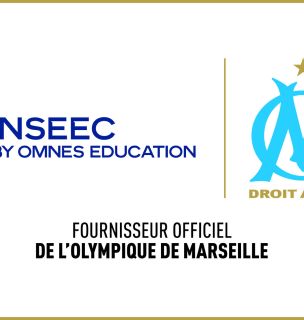Why choose the MSc Start-Up & Digital Transformation course ?
The Start-Up & Digital Transformation program aims to train entrepreneurs, strategy and/or organizational consultants, project managers, and business managers in the field of digital transformation. Indeed, digital transformation today concerns all sectors and meets very important future needs as part of a company’s evolution.
This programme is aimed at learners wishing to acquire strategic, managerial, financial, commercial and entrepreneurial skills. The training meets the requirements of versatility and global decision-making when a company is in the process of development or undergoing digital transformation that impacts both decisions in terms of human resources, of marketing and communication than information systems. The curriculum also brings real added value both in terms of business development and business. This program thus meets the needs of businesses in order to adapt their business model, approach and development to today’s world.
Discover the world of MSc Start-Up & Digital Transformation

A degree in 1 or 2 years to create one’s company or be a versatile manager within a company
- 1st year of MSc: 441 hours
- 2nd year of MSc: 441 hours
How to apply for the INSEEC MSc Start-Up & Digital Transformation ?
The requested prerequisites
The conditions for accessing the certification system (excluding VAE) are :
- For an entry into the 1st year of the course (MSc 1): to have validated a level 6 or equivalent (Bachelor’s degree type) in one of the following fields: management sciences, economics or foreign languages applied to economics, marketing and commerce.
- For entry into the 2nd year of the course (MSc 2): to have validated a level 6 or equivalent (type Master 1) in one of the following fields: management sciences, economics or management.
Want to learn more about the MSc Start-Up & Digital Transformation programme? Sign up for an Open Day!
Would you like to know more about the admission requirements of our Start-Up & Digital Transformation training?
What are the courses of the Master of Science Start-Up & Digital Transformation ?
The courses presented below are given as an example, they may vary slightly depending on the teaching campus. The content of the courses is adapted each year to changes in the market and is updated before each start.
1st year courses
COURS TRANSVERSAUX & FONDAMENTAUX – 1ÈRE ANNÉE
BUSINESS ENGLISH
- Perfect comprehension and communication techniques in the English language in a financial and legal context.
- Students may be required to take the TOEIC depending on their host campus.
SOFTWARE & DECISION-MAKING TOOLS
This module aims to deepen the students’ computer skills to meet the demand of companies in terms of budget or commercial monitoring, project management, personnel management and communication: Excel, Word, PowerPoint, team work tools, business software. It aims to be efficient with office tools, quickly identify and correct errors, customize existing tools or create your own tools.
BUDGET MANAGEMENT & DASHBOARDS
The objective is to acquire key skills in terms of budget management and reporting. Particular emphasis will be placed on the budget architecture, with the implementation of summary documents, project management control and its link with budget management, the execution and management of dashboards.
TOOLS & PROFESSIONAL METHODS
This module allows learners to improve their CV and their posture, notably through simulations (business game, professional simulation, speaking, etc.); practical and professionalizing workshops (CV, professional social networks, coaching, etc.) as well as professional and master class conferences.
CORPORATE STRATEGY & BUSINESS PLAN
This module allows you to develop the concepts and practice around business strategy. The elements of the business plan are addressed and allow to project into business creation.
NEGOTIATION
This seminar is focused on a negotiation in a national and international context. It will be necessary to take into account the cultural dimension and define its impact in an international negotiation. The national negotiation will focus on the sales process through role-playing.
SPECIALIZED COURSES
ORGANIZATIONAL AUDIT
The objective of this module is to understand the contribution of the function of different business units in the development and transformation of organizations. At the end of this course, the learner must know the main performance indicators, be able to represent globally the main processes as well as understand the internal and external audit mechanisms related to the functioning of the organization as a whole.
TECHAWAY : DATA PROCESSING & GENAI
- Deepen advanced data analysis using Python and leveraging the potential of Generative Artificial Intelligence (GenAI). Learn how AI techniques can improve data interpretation and communication via prompt engineering.
- Apply data processing strategies to concrete cases. Develop essential critical thinking to evolve in the field of data.
CHANGE MANAGEMENT & PROCESS ORGANISATIONNEL
Every company experiences changes that constitute the cornerstone of its development and its maintenance in its target market. In this context, the supervising team is at the heart of the process and change approach. This module aims to understand the change of the organization in depth and its impact on the expected managerial posture. Will thus be addressed the understanding of organizational culture and the company based on the sociological marguerite, the typology of approach to be engaged according to the context, the curve of change as well as the roles of the manager.
IA & DATA MANAGEMENT
This course allows students to acquire the fundamentals of artificial intelligence techniques (machine learning, deep learning, etc.), to develop knowledge and skills in data management (analysis, visualization, etc.) and to have an overview of the main actors and professions in this field.
DIGITAL PROJECT MANAGEMENT
- Starting from the development of a group project, the module addresses the techniques and tools for organizing and structuring a digital project in order to optimize costs, determine and meet deadlines.
- The learners will establish a risk mapping in order to anticipate them and reduce their potential impacts in terms of costs, completion times and the final quality of the project. The module will also focus on giving learners elements to optimize interactions within the project team and facilitate the achievement of its objectives.
HR MANAGEMENT & TRANSFORMATION
- Analyze the strategies related to change behaviors.
- Evaluate the changes in representations and the assessments of the issues of the different actors. Identify resistance to change and promote the involvement of stakeholders.
MANAGEMENT & LEADERSHIP
The objective of this module is to allow learners to integrate management variables into their diversity and understand the different types of management in order to be able to manage a team efficiently and without conflict. At the end of this course, the learner must be able to know the different types of management, recognize a conflict situation and manage it, identify their own functioning and effectively motivate their team.
METHOD & CONDUCT OF INNOVATION
This course aims to give a theoretical and practical overview of the main methods for generating innovation (Design Thinking, Lean method, etc.). The main obstacles to innovation from a managerial and organizational point of view will be addressed.
ORGANIZATION & MANAGEMENT OF INFORMATION SYSTEMS
This module aims to understand the company’s ecosystem (Big Data, Artificial Intelligence, ERP, CRM, Database, IoT, Cybersecurity…). In a perpetually evolving context, the management of information systems becomes a strategic and central element of company management. At the end of this module, learners will be able to pilot decisions related to the governance of an IS.
MANAGEMENT OF FINANCIAL PERFORMANCE
This module aims to teach learners the global concepts of financial strategy and business management. Learners will be able to understand the expectations of general management and financial managers through targeted concepts and financial language. The development of dashboards and performance indicators will allow the transmission of accounting and financial data related to the strategic management of the company.
STATISTICS & MARKETING DATA
This module allows to understand statistics and data from a marketing perspective. From data collection to their use in improving decision-making will be addressed.
MARKETING & COMMERCIAL STRATEGIES
- Analyze and understand all the elements influencing strategic decisions in the context of a new product launch, penetration of a new market, or modification of competition.
- Mastering market analysis tools: demand, competition, products, environment
MARKETING REMIX (OL)
Since the 70s and mass marketing intended to clear the stocks of large companies (renamed marketing 1.0), the last 50 years and especially the 2000s have seen the revolution of information technologies and the evolution of marketing practices in 2.0, 3.0 and even 4.0 according to the marketing pope Philipp Kotler in a book published in 2018. Without entering into the operational aspects of digital marketing techniques, but rather from a strategic point of view, we will see in this course how the digitalization of the world has impacted the marketing mix. On each element of this marketing mix, we will address the evolutions and good practices induced by new tools and consumer behaviors, including the growing importance of putting the customer at the heart of its strategy.
EXAMS & SUPPORT
WRITTEN EXAMS
2nd year courses
BUSINESS STRATEGY
START-UP & MARKET APPROACH
This introductory module presents the fundamentals of business creation (business plan, financing, recruitment, etc.), marketing applied to start-ups and the development of these latter.
CONSULTING & AUDIT IN THE COMPANY
Through this module, learners master the different phases of audit in business and integrate good practices in terms of consulting.
MARKETING STRATEGY & NEW PRODUCT LAUNCH
This module trains learners to develop and implement effective marketing strategies for launching new products on the market. They will learn how to analyze the market, define a clear positioning, develop a comprehensive marketing plan, manage the life cycle of a product and measure the performance of campaigns. Learners will gain the skills to successfully carry out product launches and generate growth for businesses.
SUPPORT FOR ORGANIZATIONS & DIGITAL TRANSFORMATION
Digital transformation involves changes in habits and internal practices within companies. This course therefore allows to identify the challenges of digitalization, including the relevance of the proposed solutions, user adoption in order to optimize ease of adoption and return on investment in terms of economic, financial, commercial performance, of image or even quality.
STEERING OF THE FINANCIAL & EXTRA-FINANCIAL STRATEGY
ACCOUNTING & FINANCIAL ANALYSIS
- The knowledge acquired during this module will allow mastering the accounting system as well as the constituent elements of the balance sheet and profit and loss account. The key concepts are profit formation, fixed assets, current operations (VAT); reductions, staff costs, stocks or even loans. The course will be based on case studies to facilitate understanding through an approach combining theory and practice.
- This module has the final objective of introducing learners to the financial analysis of a company. The financial analysis will focus on the analysis of activity (control of the intermediate management balance (SIG), self-financing capacity (CAF)). But also in the analysis of the financial structure (equity operations, operations, cash flow, supplements).
TOOLS FOR MEASURING & MANAGING PERFORMANCE
The first part of the course focuses on analyzing a company’s accounts. In order to manage performance, it will be necessary to determine the reference costs allowing to assess and optimize its performance. It is also about being able to create or implement a dashboard, manage one’s activity, finally optimize the indicators and anticipate financial deadlines.
PROJECT FINANCING & BUDGET MANAGEMENT
This module allows mastering the issue of budget management including :
- The budget architecture with implementation of summary documents.
- Project management control and its link with budget management.
- The management of dashboards and reporting.
- In parallel, the principles of project financing will also be presented, including the following skills:
- Establish and follow a budget and a financing plan.
- Set up an analytical accounting.
- Calculate the profitability of a project.
- Analyze a file from a business plan.
- Implementation of a pre-study to lead to the investment committee.
VENTURE CAPITAL & BUSINESS PLAN
- How to create a business plan for fundraising: demonstrate the existence of the market, the growth potential, define the desired contributions and the funders’ equity investments.
MARKETING & SALES MANAGEMENT
CRM & STRATEGIC ISSUES
- This module aims to allow learners to understand what customer relationship management is and to know the main data management platforms.
- It will thus be a question of being able to know how to collect and analyze the relevant data to understand its users and create actionable databases; to set up efficient loyalty programs; and finally to know the approach to choose and implement the right CRM tool in their organization.
WEB STRATEGY
This module trains learners to develop and implement effective digital strategies to achieve a company’s goals. They will learn how to analyze the market, define a relevant content strategy, optimize natural referencing (SEO), manage online advertising campaigns and measure the performance of actions taken. Learners will acquire the skills to develop a strong online presence and generate qualified traffic to their website.
BUSINESS DEVELOPMENT & COMPLEX SALES
- Master the techniques of approach and preparation for negotiation with key accounts. Collect and analyze customer information to better understand them.
- Identify stakeholders in the decision-making process.
MARKETING & INNOVATION MANAGEMENT
Innovation management requires knowing the different phases of an innovation project and setting up the appropriate human resources. It is also about knowing the respective roles of the project manager, the financial and documentary aspects of a project until its launch.
TEAM MANAGEMENT
NEW METHODS OF ORGANIZATION
This module allows discovering ‘acquire the skills necessary to implement innovative organizational methods. The program covers the following aspects :
- Traditional methods of organization: students learn to master classical methods of organization, such as the Kanban method, the Scrum method, etc.
- Innovative organizational methods: students learn to implement innovative organizational methods, such as the Agile method, the Lean method, etc.
- The objective is to implement innovative organizational methods in order to improve team efficiency and productivity, manage complex projects and drive change.
CHANGE MANAGEMENT
IT projects are at the heart of innovation and generally cause a disruption in business processes and a change in user practices. Change management aims to facilitate the acceptance of changes induced by the implementation of a new project and to reduce rejection factors. Will thus be addressed the missions of the project team, the involvement of users and different levels of management, the identification of operational managers and key actors as well as the various tools and their implementation conditions.
TOOLS & PROFESSIONAL METHODS
This module allows you to appropriate the methods and tools discussed during the training and ensure their integration and proper implementation by the learners.
PROJECT MANAGEMENT
- Implement project and team management.
- Taking into account the techniques used and measuring the return on investment in managing such projects.
- Define and negotiate cost, quality and deadline objectives.
- Organize a project (OBS) and define the responsibilities and tasks.
- Pilot a project and manage human and financial resources.
- Smooth the resources.
- Break down a project (WBS, PBS).
- Set up a Data Management Platform.
ENTREPRENEURIAL PROJECT
APPLIED RESEARCH DISSERTATION
The applied research thesis aims to develop analytical and reflection skills around a managerial question. It is an opportunity to demonstrate its rigor in the analysis of a problem or managerial issue and the formulation of operational recommendations. The research thesis reflects the research work and is structured into three main stages: the review of the literature, the qualitative and/or quantitative study and its results, and the managerial recommendations.
AGILE METHODS & SPRINT DESIGN
- Manage and monitor a data project from its conception to its evaluation (REX), organize and inspire collective intelligence through collaborative methodologies, master and drive change in organizations for innovative marketing: agile methods (Scrum, Design Thinking, etc.)
- This seminar allows implementing agile project management through the Design Sprint method. Learners can thus test this method in real time and dive into the heart of a project.
TECHAWAY : DATA VISUALISATION & DATA ANALYSIS
- Apply the most relevant tools for data mining, reporting and dashboarding.
- Understand the fundamentals of UX (user experience) and UI (user interface) design, including design principles and user-centric design.
DATA MANAGEMENT & RGPD
This module trains students in effective data management while respecting the General Data Protection Regulation (GDPR). Participants will learn how to collect, store, analyze and secure personal data in accordance with European regulations. They will gain in-depth knowledge of data governance, privacy and regulatory compliance. Students will thus be able to implement robust and secure data management strategies within organizations.
EXAMS & SUPPORT
WRITTEN EXAMS & THESIS DEFENSE
- Written exams
- Thesis defense
What are the beginnings and study schedules ?
Two intakes per year are organized, in February/March and September/October. To check the opening of each school year, contact the admissions service directly.
The pace of courses can differ depending on the campus and whether the training is carried out under an internship agreement (initial) or a professionalization/learning contract (continuous).
The work-study contract must be signed for a duration of 12 months (MSc 2) or 24 months (MSc1 + MSc 2).
To find out the duration of the contract during the delayed start period, contact the campus admissions service that interests you directly.

Career opportunities after a MSc in Start-Up & Digital Transformation
- Executive/Manager/Business Manager
- General Manager
- Deputy Director/Managing Director
- Director of business unit/subsidiary
- Head of agency/Agency manager
- Entrepreneur
- Consultant in organization/business strategy
- Manager of the company’s CSR
To consult the detailed job sheets by specialization.
What are the business skills developed ?
The objectives in terms of skills are :
- Design and develop the strategic orientations of the company/organization
- Manage the financial and extra-financial strategy of the company
- Manage the marketing and commercial strategy
- Manage teams and drive organizational transformations
To these common blocks of skills, the following optional sectoral specialization is added :
- Develop an entrepreneurship and/or intrapreneurial project
Description of the procedures for acquiring certification by capitalization of skill blocks and/or correspondence
- The validation of four blocks of skills common to all pathways as well as a specialization block based on the candidate’s path (obtaining a score equal to or greater than 10/20 for each block of skills);
- The completion of a corporate period of at least 132 days in the second year of the course (MSc 2).
Professional certification
Professional certification of «Manager of Companies and Organizations», NSF code 310, issued by INSEEC MSc (CEE-SO, CEE-RA, CEFAS, MBA INSTITUTE, ADEFI FORMATION, CEE-M, CEE-OUEST), registered under number 40353 at the RNCP (National Directory of Professional Certifications) by decision of the Director General of France Compétences on April 21, 2025.
The certification is delivered by capitalization of all skill blocks. Each skill of a block must be confirmed to obtain the skills block. Partial validation of a block is not possible. It is also accessible by the way of the Validation of Acquired Experience.
For more details, please consult the online repository : https://www.francecompetences.fr/recherche/rncp/40353
What are the teaching methods ?
Teaching methods
- Lectures and interactive courses.
- Situational exercises through collective or individual case studies carried out by the students.
- Conferences, seminars and educational visits.
Evaluation methods
- Individual and/or group case studies
- Individual and/or group oral presentations
- Individual and/or group files
- Applied research thesis with individual defense
Methods and tools
- The evaluation methods are face-to-face, in the form of continuous assessment or final exams in the form of mid-term exams.
What are the 2025/2026 tuition fees to join the training ?
FALL INTAKE – 2025
Initial training:
- MSc1: €10,990
- MSc2: €12,950
Apprenticeship program:
- 24 months : €23,400 before tax
- MSc2 : €13,490 before tax
International students pack
Mandatory fee of €700 for exclusive support services for international students living outside the European Union.
SPRING INTAKE – 2026
Initial training:
- MSc1: €10,990
- MSc2: €12,950
Apprenticeship program:
- 24 months : €23,400 before tax
- MSc2 : €13,490 before tax
International students pack
Mandatory fee of €700 for exclusive support services for international students living outside the European Union.
In the context of work-study training, tuition fees are payable by the OPCO and the company signing the contract.
Do you have any questions about work-study or our school in general ? Consult our frequently asked questions.
VAE/VAP
- VAE: €4,800 before tax
- VAP: €850 before tax
International students pack
Mandatory fee for exclusive support services for international students living outside the European Union.
- Fall intake (2025) – September/October: €700
- Spring intake (2026) – February/March: €700
Application fee
The application fee is €80.
What kind of financial aid is available?
INSEEC offers several financial aid schemes:
- The alternating rhythm, in internship or work-study contract.
- The right to training via the CPF.
- Banking partnerships.
the key figures for RNCP n°36493 "Manager of companies and organizations"
95%
National success rate – Promo 2024
100%
Rate of presentation – Promo 2024
96%
Global insertion rate – Promo 2023
89%
Satisfaction rate at 6 months – Promo 2023
What is the Disability policy in our school ?
The OMNES Education Group pays particular attention to the societal environment, including the disability dimension. Indeed, we believe that students with disabilities should not have any problems in pursuing their studies and starting a professional career. We accompany them to facilitate their access to the premises, offer them personalized advice as well as adapted accommodations throughout their school career.
Accessibility of premises: all our campuses are accessible to people with disabilities.
To learn more about the OMNES Education Group’s disability policy, click here.
Contacts for disability referents by campus:
- Bordeaux: Maxime DOUENS – mdouens@inseec.com
- Lyon: Anissa GASMI – agasmi@inseec.com
- Rennes: Laura LE CALVEZ – llecalvez@omneseducation.com
- Paris: Farid HAMAD – fhamad@inseec.com
- Chambéry: Marianne FERLAY – mferlay@inseec-edu.com
- Marseille: Océane VALOTTI – ovalotti@omneseducation.com
- Toulouse: Amanda MARNEIX – amarneix@omneseducation.com
News

June 2024
INSEEC hosted the CFNews Grands Prix de la Croissance Externe Sud Ouest for the second year running
Read more





